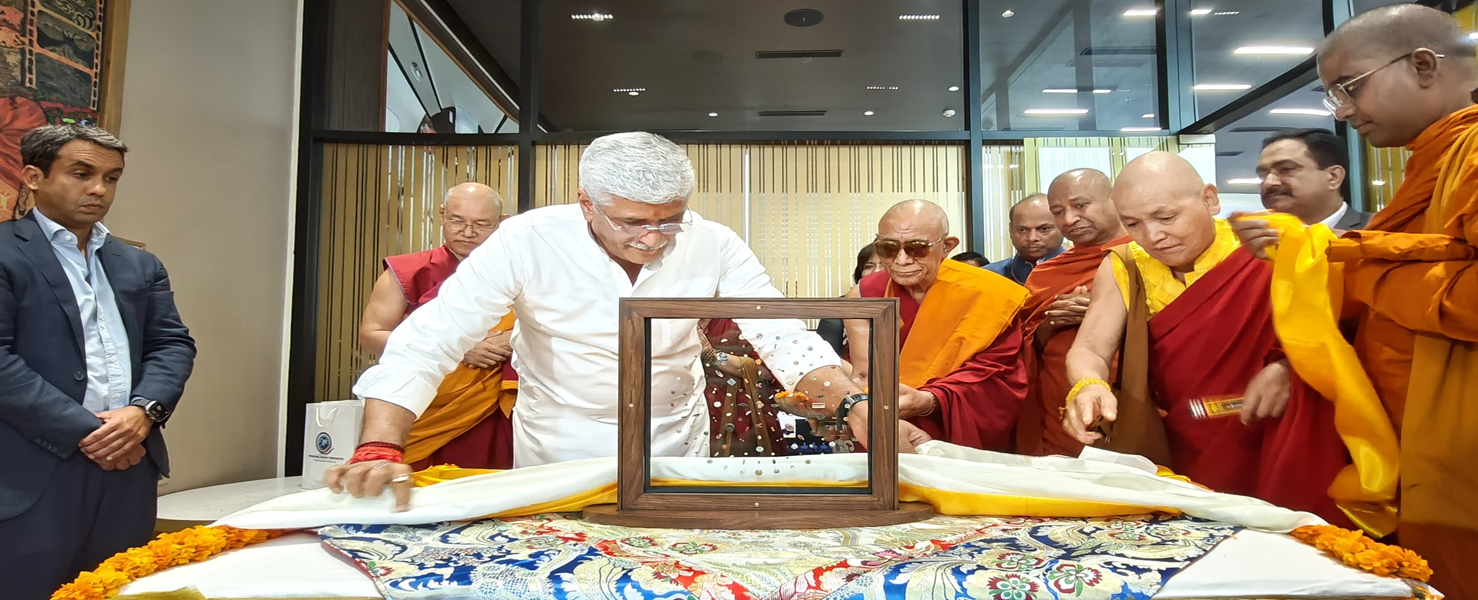-

Repatriation Ceremony of the Piprahwa Relic Jewels


A prestigious ceremonial event was held under the aegis of the Ministry of Culture, Government of India, on 30 July 2025 to mark the repatriation of the historic Piprahwa relic jewels after 127 years. Key institutions of the Culture Ministry who played a pertinent role in this process included Archaeological Survey of India, National Museum (New Delhi), Indian Museum (Kolkata), International Buddhist Confederation (IBC), among others. Apart from senior members of the Sangha from both traditions, the following dignitaries graced the event:

The Piprahwa relic jewels constitute one of the most remarkable archaeological discoveries in Buddhist history—these 349 artifacts—including precious gems and gold ornaments—date back to the Mauryan period (321 BCE to 185 BCE).
These antique jewels were discovered at an ancient Buddhist stupa located in Piprahwa, Uttar Pradesh. This significant excavation took place in 1898, led by archaeologist William Claxton Peppé.

During the dig, a remarkable array of items was unearthed, including bone fragments, intricately crafted soapstone and crystal caskets, a sandstone coffer, and a variety of sacred offerings such as gold ornaments and gemstones. The Piprahwa gem collection showcases a mesmerizing array of intricately sculpted jewels—delicate lotus blossoms, graceful foliage, and the revered Triratna symbol—all fashioned from a palette of exquisite stones: amethyst, aquamarine, carnelian, coral, citrine, garnet, and shimmering rock crystal. Complementing these gems are 33 impeccably crafted gold ornaments, each radiating timeless elegance.

The historical importance of this find was solidified by an inscription in Brahmi script on one of the caskets. This inscription confirmed that the relics were associated with the Buddha and had been respectfully deposited by the Sakya clan, believed to be the Buddha’s lineage. This discovery has continued to be a cornerstone of Buddhist archaeological heritage and spiritual identity.

Upholding its immense historical and spiritual significance, the Ministry of Culture, Government of India successfully intervened in the auction of Piprahwa relics on 7 May 2025 and issued a legal notice to Sotheby’s Hong Kong, seeking immediate cessation.
In processing the repatriation, Sh. Pirojsha Godrej played a vital role as a philanthropist by privately acquiring the collection to ensure its swift return to the nation. The Government of India demonstrated a strong commitment to cultural preservation by actively supporting the repatriation process and recognizing the value of restoring India's heritage to its rightful place. This restoration symbolizes India's civilizational legacy and reaffirms its identity as the birthplace of the Buddha Dhamma. Moreover, it highlights the government's role as a guardian of Indian heritage and its dedication to safeguarding cultural treasures for future generations.

Sh. Godrej arrived with the antique jewels on the forenoon of 30 July 2025. He was received by the Hon’ble Union Minister of Culture, Sh. Gajendra Singh Shekhawat, top bureaucrats from the ministry along with a group of senior sangha members. In keeping with the protocol and rituals of receiving the holy relics, a traditional Tibetan monastic instrument, Gya-Ling (the Tibetan Reed Shawm) was played by monks, which was followed by chanting in both Mahayana and Theravada traditions.
The Minister and other officials paid homage to the relics and then, with the head-of-the-state convoy, proceeded to the National Museum for a brief spiritual ceremony, walk-through of an exclusive exhibition for the occasion, and press conference.


Prior to the press conference, Sh. Gajendra Singh Shekhawat and Sh. Pirojsha Godrej were taken through an exhibition titled “Unearthing the Sacred Piprahwa – The Story of the Holy Buddha Relics and Their Discovery”, which was created by the IBC.
Sh. Gajendra Singh Shekhawat commenced the press conference with compelling introductory remarks that emphasized India’s rich cultural legacy and its growing global recognition. He not only spoke about India’s heritage being revered worldwide and how cultural diplomacy is strengthening international ties, but also underscored the government’s commitment to retrieving antiquities as a moral imperative. He emphasized that much against the traditional belief, the relics were retrieved in a very short time frame.

Sh. Vivek Agrawal, Secretary of the Ministry of Culture, offered a nuanced perspective on the repatriation of cultural artifacts. His presentation on the Piprahwa relics covered the details of the process of the return of the antiquities involved, along with the emotional and cultural impact on communities when such heritage is restored.
The event culminated in an engaging interactive session with members of the press, creating a space for dialogue and deeper understanding of the cultural milestone being celebrated. Media representatives were invited to ask questions, share insights, and explore the broader significance of the achievement, fostering greater public awareness and appreciation.

Speaking on behalf of the Ministry of Culture, dignitaries took a moment to extend heartfelt thanks to all those who contributed to the success of the ceremony. The closing remarks underlined a continued commitment to nurturing and celebrating the rich cultural heritage of the nation. The Ministry expressed optimism for future collaborations and pledged ongoing support for initiatives that elevate cultural awareness and preservation.


The International Buddhist Confederation (IBC) conducted an exhibition on “Unearthing The Sacred Piprahwa: The Story of the Holy Buddha Relics and Their Discovery”.
